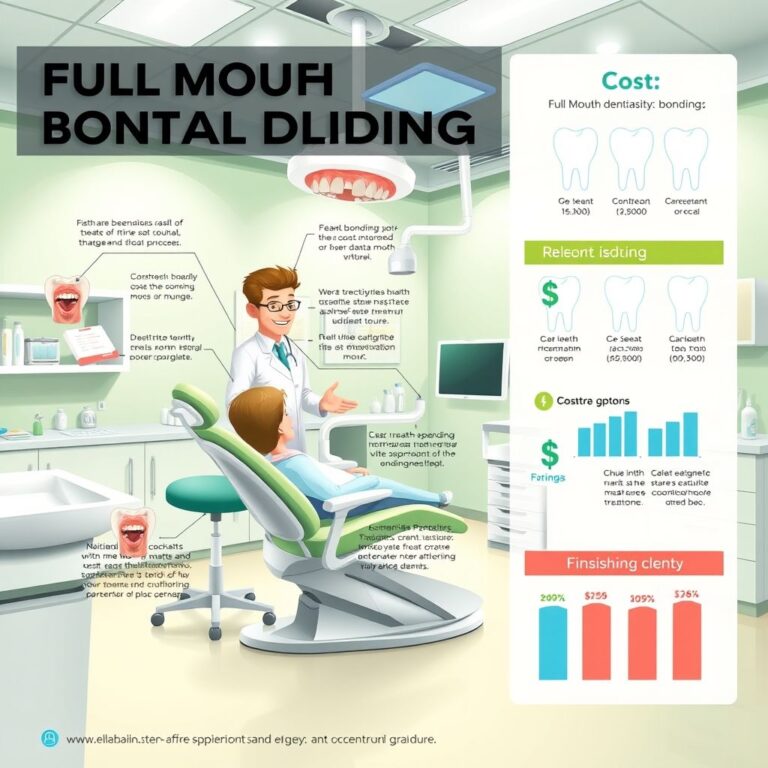Unveiling the Smile Refresh: A Comprehensive Guide to Dental Bonding Costs in Florida
For many Floridians, a bright, beautiful smile is a coveted asset. Yet, chipped teeth, gaps, or discoloration can significantly impact confidence and self-esteem. Fortunately, dental bonding offers a cost-effective solution to restore a dazzling smile. This article delves into the world of Dental Bonding Costs in Florida, providing a thorough exploration of its costs, factors influencing pricing, and valuable tips for navigating the procedure.

The Allure of Dental Bonding
Dental bonding is a cosmetic dentistry procedure that utilizes composite resin, a tooth-colored material, to repair or enhance the appearance of teeth. The resin is sculpted and meticulously bonded to the tooth’s surface, seamlessly integrating with the surrounding enamel. This versatile treatment addresses a variety of aesthetic concerns, including:
- Chipped or cracked teeth: Whether due to accidental trauma or natural wear and tear, bonding effectively repairs minor chips and cracks, restoring the tooth’s original shape and function.
- Gaps between teeth: Small gaps between teeth can be aesthetically unappealing and even contribute to speech impediments. Bonding bridges these gaps, creating a more uniform and natural-looking smile.
- Discolored teeth: Stubborn stains or mild discoloration can detract from a smile’s brilliance. Bonding can effectively mask discoloration, revealing a brighter, whiter appearance.
- Uneven tooth shape: Minor irregularities in tooth shape can be addressed through bonding, creating a more balanced and aesthetically pleasing smile.
Beyond aesthetics, dental bonding offers several practical benefits. It’s a minimally invasive procedure, preserving more of the natural tooth structure compared to alternatives like crowns. Additionally, bonding is often completed in a single visit, making it a time-efficient solution.
Understanding Dental Bonding Costs in Florida
The cost of dental bonding in Florida varies depending on several key factors:
- Dentist’s experience and location: The expertise and reputation of the dentist can influence pricing. Generally, dentists with extensive experience in cosmetic dentistry may charge more. Location also plays a role, with costs potentially higher in urban areas compared to rural settings.
- Complexity of the procedure: The extent of the repair or enhancement required will impact the cost. Simpler repairs like minor chips typically incur lower costs than complex procedures involving multiple teeth or significant reshaping.
- Amount of composite resin used: The quantity of resin needed for the bonding procedure affects the price. More extensive repairs naturally require more material, leading to higher costs.
- Type of composite resin: The specific type of composite resin used may vary in price. Higher quality resins offering greater durability or a more natural tooth-like appearance may come at a premium.
- Dental insurance coverage: While dental insurance typically doesn’t cover purely cosmetic procedures, it might offer partial coverage for bonding deemed necessary due to minor tooth damage.
A Snapshot of Dental Bonding Costs in Florida
To provide a general idea, dental bonding in Florida typically ranges from $300 to $1,200 per tooth. However, it’s crucial to remember that this is a broad estimate. Here’s a table outlining potential cost variations based on the complexity of the procedure:
| Complexity of Procedure | Estimated Cost per Tooth (USD) |
|---|---|
| Minor chip repair | $300-$400 |
| Moderate chip repair or gap closure | $400-$600 |
| Complex repair involving significant reshaping or multiple teeth | $600-$1,200 |
Additional Considerations Affecting Cost
Beyond the factors mentioned above, several other aspects can influence the final cost:
- Anesthesia: If local anesthesia is required to ensure patient comfort during the procedure, an additional fee may apply.
- Consultation fees: Some dental practices may charge a consultation fee to discuss the procedure and assess your needs.
- X-rays or other diagnostic procedures: Depending on the complexity of the case, X-rays or other diagnostic tools might be necessary, adding to the overall cost.
Financing Your Dental Bonding Procedure
The cost of dental bonding shouldn’t deter you from achieving your dream smile. Here are some financing options to consider:
- Dental insurance: As mentioned earlier, check with your insurance provider to determine if they offer any coverage for bonding deemed necessary due to minor tooth damage.
- CareCredit or similar financing plans: Several healthcare financing companies offer patient financing plans with low or no interest, allowing you to spread out the cost of your procedure over time.
- Payment plans: Many dental practices offer in-house payment plans, enabling you to make manageable monthly payments.
Finding the Right Dentist for Your Dental Bonding Needs
Choosing a qualified and experienced dentist is paramount for optimal results and a positive experience. Here are some tips for finding the right dentist for your dental bonding procedure:
- Seek recommendations: Ask your friends, family, or primary care physician for recommendations of dentists with expertise in cosmetic dentistry. Online review platforms can also be a helpful resource, but prioritize recommendations from trusted sources.
- Research dentist qualifications: Verify the dentist’s credentials and experience. Look for dentists who hold memberships in professional organizations like the American Academy of Cosmetic Dentistry (AACD) or the American Dental Association (ADA).
- Schedule consultations: Consult with at least two or three dentists to discuss your specific needs and preferences. This allows you to compare treatment plans, costs, and bedside manner to find the dentist who best aligns with your expectations.
- Ask about the dentist’s experience with bonding: Inquire about the dentist’s experience performing dental bonding procedures. Ask to see before-and-after photos of their bonding work to get a visual representation of their skills and aesthetic results.
- Discuss cost and financing options: Be upfront about your budget and explore financing options offered by the dental practice.
The Bonding Procedure: What to Expect
Dental bonding is a relatively straightforward procedure. Here’s a general outline of what to expect:
- Consultation: During the initial consultation, the dentist will thoroughly examine your teeth, discuss your desired outcomes, and assess your suitability for bonding. They will also explain the procedure, answer your questions, and provide a cost estimate.
- Preparation: The tooth receiving the bonding will be thoroughly cleaned and lightly roughened to enhance the bonding material’s adhesion. Local anesthesia may be administered if needed for patient comfort.
- Shade selection: The dentist will carefully select a shade of composite resin that closely matches the color of your surrounding teeth, ensuring a natural-looking result.
- Resin application: The dentist will meticulously sculpt the composite resin onto the tooth, shaping it to restore the desired form and function. A special light is then used to harden the resin.
- Trimming and polishing: Once the resin has hardened, the dentist will meticulously trim and polish the bonded area to achieve a smooth, natural-looking finish.
Maintaining Your Bonded Teeth
With proper care, bonded teeth can last for several years. Here are some essential tips for maintaining your bonded teeth:
- Practice good oral hygiene: Brush your teeth twice daily and floss once daily to remove plaque and food debris that can contribute to staining or damage to the bonding.
- Avoid staining foods and beverages: Limit your intake of coffee, tea, red wine, and other substances that can stain the bonding material.
- Don’t use your teeth for tasks other than chewing: Avoid using your bonded teeth for activities like biting fingernails or opening hard objects, as this can damage the bonding material.
- Schedule regular dental checkups: Regular dental checkups and cleanings are crucial for maintaining oral health and ensuring the longevity of your bonded teeth.
Frequently Asked Questions (FAQs) About Dental Bonding in Florida
- Is dental bonding permanent? No, dental bonding is not a permanent solution. While it can last for several years with proper care, it may eventually chip, wear down, or stain, requiring repair or replacement.
- How long does the dental bonding procedure take? The duration of the bonding procedure can vary depending on the complexity of the case. However, it’s typically completed in a single visit, often lasting between 30 minutes to an hour.
- Will dental bonding damage my teeth? Dental bonding is a minimally invasive procedure that generally doesn’t harm the underlying tooth structure. However, in rare cases, removing the bonding material might necessitate removing a small amount of enamel.
- What are the alternatives to dental bonding? Depending on the severity of the issue, alternative solutions like veneers or crowns might be considered. Veneers are thin shells of porcelain bonded to the front surface of the tooth, offering a more durable and stain-resistant option. Crowns completely encase the tooth, providing the most robust solution for significant damage or structural weakness.
Additional Resources
- American Academy of Cosmetic Dentistry (AACD): https://aacd.com/
- American Dental Association (ADA): https://www.ada.org/
Conclusion
Dental bonding offers a versatile and cost-effective solution for achieving a brighter, more confident smile in Florida. By understanding the factors influencing costs, exploring financing options, and prioritizing qualified dental professionals, you can embark on your dental bonding journey with informed decision-making. Remember, a dazzling smile is an investment in your overall well-being and self-esteem.


